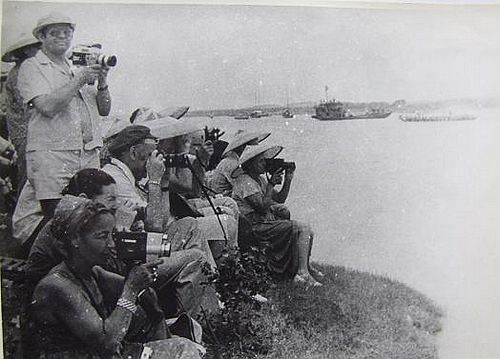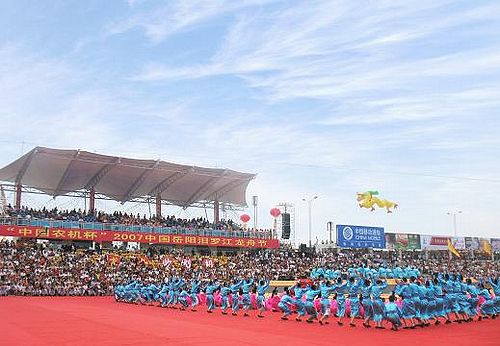Duanwu Customs Observed in Places Along the Miluo River
Since Qu Yuan drowned himself in the Miluo River on the fifth day of the fifth month of Chinese lunar calendar in 278 BC, Duanwu (Dragon Boat Festival) customs that were observed by people living along the Miluo River have been closely connected with a river (Miluo River), a world-famous poet (Qu Yuan) and a time-honored ancient temple (Quzi Temple). The original cultural connotation of Duanwu customs was therefore further enriched and dragon boat racing was born. The Miluo River became ¡®the upstream¡¯ of Chinese culture, the birthplace of dragon boat racing, the holy land of national spirit sublimation and a mecca for myriad literati.
Duanwu Customs celebrated by residents living at the banks of the Miluo River, consisting of a series of rich, unique and mysterious customs, prevailed in places along the middle and lower reaches of the Miluo River in Miluo City. Today, the Miluo¡¯s dragon boat festival is usually celebrated from the first day to the fifteenth day of the fifth lunar month. The whole celebrations have profound implications due to its long history, diversified forms, rich culture, enthusiastic support from and active involvement of locals.
In addition to commonly known regular customs of making a feast, eating Zongzi (glutinous rice dumplings), inserting artemisia argyi, drinking realgar liquor and holding dragon boat races, people living along the Miluo River in Chutang fishing street, Fenghuang Mountain, Heshi, Guiyi, Honghua, Xinshi, Wukou and Changle celebrated Dragon Boat festival by observing other mysterious rituals and distinctive cultural customs, such as carving dragon head, stealing sacred wood, singing eulogy, launching dragon boat, tying a red cloth on the dragon¡¯s head, rowing to worship at Quzi Temple, and offering sacrifice to dragon and to Qu Yuan. Many festival-related folk rhymes have even been handed down through years, like ¡°Better leaving field uncultivated for a year than losing dragon boat racing in the fifth lunar month¡±.
Such customs as watching dragon boat races, visiting the parental home, ringing out the festival, inserting artemisia argyi and drinking realgar liquor are full of local features. Fragments of these observances have been recorded since the Han Dynasty (206 BC ¨C 220 AD) in works of Offering Sacrifice to Qu Yuan by Yan Yanzhi in 424 AD, Xu Qi Xie Ji and Jingchu Chronicle by Wu Jun at the beginning of the sixth century AD, and Book of Sui: Records of Geography.
In 2005, Duanwu Customs of the people living along the Miluo River was included in the first batch of national intangible culture heritage list. On Sept. 30, 2009, the traditional Chinese dragon boat festival (including Duanwu Customs observed along the Miluo River) was inscribed on the UNESCO Representative List of Intangible Cultural Heritage of Humanity, which was deliberated and approved at the Fourth Session of the Intergovernmental Committee for Protecting Intangible Heritage of the UNESCO in Abu Dhabi.
In the early 1980s, Duanwu Customs celebrated by locals living along the Miluo River attracted worldwide attention. During every dragon boat festival, special coverage about the festival was made by news media from Taiwan, Hong Kong, Macao and Japan. Featured reports were made to promote dragon boat racing, Qu Yuan, Quzi Temple and Miluo River through many international TV programs, such as Germany, USA, Australia, Italy, UK, former Soviet Union and South Korea. Up till now, the dragon boat racing has been practiced in more than 40 countries and regions.

Miluo Dragon Boat Race held in the 1950s

Miluo Dragon Boat Race held in 1980

International friends watching dragon boat racing

China (Miluo) International Dragon Boat Festival 2007

China (Miluo) International Dragon Boat Festival 2007
Source: yueyang.gov.cn